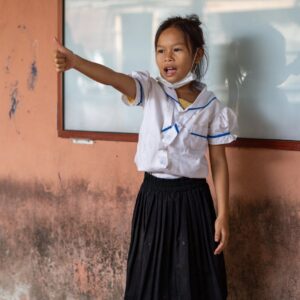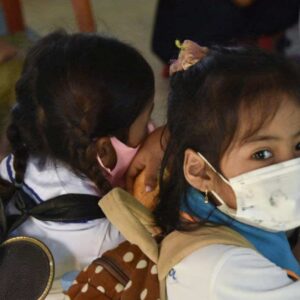In Cambodia, Aide et Action is supporting women-headed households with livelihood training and in-kind materials to enable marginalised women to try new business ideas, increase their incomes, and build a more equitable society.
In Cambodia’s rural northwestern province of Kampong Thom, 51-year old farm labourer Sin Koeun found herself the sole breadwinner of her family of three dependents after her husband unexpectedly died in 2020 and in need of a new job.
Before he passed away, Koeun and her husband worked together on a cashew nut and cassava farm, earning approximately US$12 per day which was stretched at the best of times to keep her daughter and grandson in school. When the Covid-19 pandemic hit Cambodia in March 2020, Koeun found herself struggling not only with the sudden loss of her husband but also the loss of her income and a deterioration in her own health.

“It was a very difficult time for me” explains Koeun. “My revenue does not balance out our daily expenses, especially when I too had also fallen sick.”
In a bid to provide for the family, her son migrated to Thailand in search of work. While at times he has been able to send money back to support his mother who also fell ill, his work is insecure and his income ebbs and flows with the outbreak waves of Covid-19. Koeun’s son dropped out of school in Grade 2 and without an education behind him, his work options are limited.
Building resilience
Currently, Koeun’s daughter is in lower secondary school and her grandson is primary school despite her meagre income she did not wish to sacrifice their education. To support women like Koeun to keep their children in school, Aide et Action, thanks to funding from the European Union, has been promoting and building the capacity of small-scale female-led enterprises so that women can increase their income. To date, we have supported more than 180 communities in Koen’s province as well as in Kandal, Pursat, and other provinces across Cambodia.
Under our Holistic Educational Strategies for Pro-Poor Community Development project, Sin Koeun was introduced to poultry farming. In June 2021, she received 10 chickens along with the necessary supplies such as poultry feed and a chicken coop and training with experts from the ministry of agriculture on how to raise the chickens. Since then, she has grown a small business that she hopes will provide a better income for her family.
“I received 10 chickens back in June, and now it has increased to 15 chickens. I am still working in the fields and waiting a bit more so that I can breed more chicks. I’m optimistic that I can sell them for a very good price,” says Koeun.

Addressing inequalities
In Cambodia, women’s labour is often not as highly valued in the labour market compared to men’s and women working in the informal sector have faced unemployment more acutely (22%) compared to men (13%) during the pandemic according to research from UNDP.
Understanding the barriers that women face in accessing equitable employment opportunities and supporting them has been a focus of our work during the pandemic. The poultry business has been a turning point for Koeun and her family. Now as her business is growing, Koeun hopes that she can fully focus on livestock and reduce the hours she spends working in the cashew and cassava fields.
“I hope the poultry business will progressively grow. If it goes well, I will start raising pigs too. I will stop working in the field as the world is so exhausting for my age. I will spend my entire time on chickens and pigs instead,” she said.
Her focus is also on keeping her daughter and grandson in school so they may have options beyond insecure agricultural work when they become adults. While the kids helped out with raising the livestock during school closures, she was eager to send them back to education.
“When schools reopen, I will send my daughter and grandson back to school. I would like my daughter to become a doctor.”
As we mark International Women’s Day on 8 March 2022, we continue to support women-headed households like Koeun’s to earn better livelihoods and to support children, particularly girls, at risk of dropping out of school.





